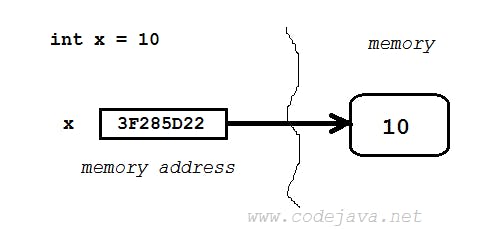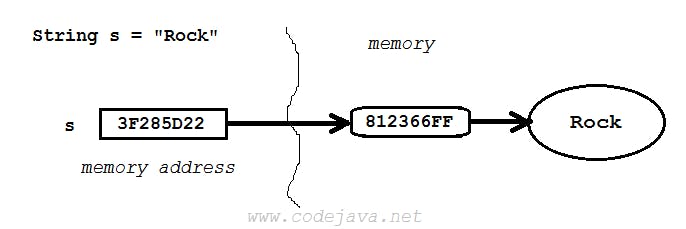Hey there! If you're new to learning Java or already a Java developer, you might have heard people say that 'strings are immutable and cannot be modified.' But often, nobody really explains the reason behind it, or if they do, it's not easy to remember.
But don't worry! In this article, I've simplified everything about strings in Java, making it easy to understand for everyone. Whether you're just starting or need a quick revision, you'll grasp all the essential concepts related to strings in Java. Let's get started!
Strings
In Java, a string is a type of data that refers to objects rather than holding a direct value. These types are called reference types (Non-Primitive data type). When we define a string, it points to a location in memory where the data is stored in the heap memory. This location represents the object's contents. So, we say a string variable is a reference to this memory location. Here's an example of how we represent strings in Java:
String name = "Light Yagami"; // name is reference variable because it stores memory address of object.
String Pool

Java has a concept called the "string pool." It is an area in the heap memory where string literals are stored. When we create a string using a literal, Java first checks if that literal already exists in the pool. If it does, it simply returns a reference to the existing instance. If not, it creates a new string object in the pool.
public class Strings {
public static void main(String[] args) {
String name = "Light"; // name points to "Light" in the string pool
String surname = "Light"; // surname also points to the same object in the string pool
String book = new String("Light"); // This creates a new object in the heap memory.
System.out.println(name == surname); // true
System.out.println(name == book); // false
}
}
In the above example, the book points to a new object in the heap memory because we used the new keyword explicitly. It's essential to remember that string literals created with the new keyword are stored in the Java heap, not in the string pool.
Pass-by-Value or Pass-by-Reference?
This is another common question that many folks ask. I thought it would be a great idea to cover this topic in the same blog since it's not that difficult to understand. In Java, each variable is associated with a unique number that represents the memory address of the value it holds. For primitive variables, the memory location directly stores the actual value. Here's a simple diagram to illustrate this concept:

For reference variables, the memory location stores the memory address of the actual object, not the object itself. In other words, a reference variable doesn't store the object directly; it holds a reference (memory address) to the object. Here's a simple diagram to illustrate this concept:

Java always passes object references to methods by value. This means it passes the memory address of the object that the variable points to, not the variable itself or the object itself. Consequently, we cannot change the reference of a passed-in variable inside a method.
Immutable Strings in Java
Now, let's focus on why strings are immutable in Java. When we create a string variable and assign it a value, like this:
String name = "Light Yagami";
The string "Light Yagami" is stored in memory, and the variable name holds the reference to that memory address. In Java, strings are designed to be immutable, meaning once a string object is created, its value cannot be changed. If you try to modify a string, Java creates a new string object with the updated value instead of modifying the original one. Let's look at this example:
public class ImmutableStrings {
public static void main(String[] args) {
String name = "Arima"; // name points to "Arima".
name = "Light"; // name now points to "Light".
System.out.println(name);
}
}
In this example, first, name points to Arima. Then, in the next line, we change name to point to Light. Java creates a new object in the string pool for "Light," and name now points to that new object. The old object "Arima" is removed from memory by garbage collection.
This design offers several advantages, such as making strings thread-safe, ensuring security in certain scenarios, and enabling more efficient memory usage.
In conclusion, strings are immutable in Java to maintain the integrity of the data and ensure a safer programming environment. Understanding this concept will help you write better and more reliable Java programs.
I hope you learned something from this blog. If you have, don't forget to drop a like, follow me on Hashnode, and subscribe to my Hashnode newsletter so that you don't miss any future posts. You can also reach out to me on Twitter or LinkedIn. If you have any questions or feedback, feel free to leave a comment below. Thanks for reading and have a great day!
